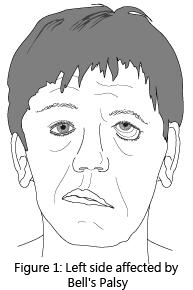What is Bell's palsy ?
Bell's palsy is a form of temporary facial paralysis resulting from damage or trauma to facial nerves. It is the most common cause of facial paralysis. Bell's palsy is paralysis or weakness of the facial muscles on one side only, along with a sagging eyebrow and difficulty in closing the eye (Figure 1). Mild earache or pain behind the ear is sometimes the first sign of Bell's palsy. The condition is fairly common. It can affect all age groups, including children, but seems to be most common between the ages of 15 and 45. Men and women are equally affected. Most people can recover completely within two months with appropriate treatments given.
What are the causesˇH
The etiology of Bell palsy remains unclear, but some factors include the following:
 1. Viral infections: In reaction to the virus, the facial nerve within the ear bone swells, and this pressure on the nerve in the bony canal damages it.
1. Viral infections: In reaction to the virus, the facial nerve within the ear bone swells, and this pressure on the nerve in the bony canal damages it.2. High winds directly onto the face.
3. Pregnancy and Diabetes.
4. Other causes: Head injuries, rheumatoid arthritis, otitis media, brain tumor, etc.
What are the symptomsˇH
- a sagging mouth, eyebrow and difficulty in closing the eye
- dryness or watering of the affected eye
- dribbling of saliva and drinks
- difficulty in speaking
- alteration or loss of taste at the front of the tongue
- Earache or pain behind the ear
- unusually sharp hearing on the affected side
What are the treatments and prevention?
- To use ice, infrared, ultrasound, electrical muscle stimulation in order to reduce any pain and muscle spasm.
- Facial exercises and massage can be used for muscle strengthening and prevent facial fibrosis.
- Bell's palsy may make it hard to close your eyelid. These safeguards can help stop the surface of your eyeball drying out.:
ˇE Regularly close the eye by pulling the upper lid down with your finger. Doing this will help keep the eye moist.
ˇE Wear protective glasses or an eye patch.
ˇE Tape the eye closed before you go to sleep.
ˇE Use artificial tears to keep the eye moist (ask your doctor for advice).



